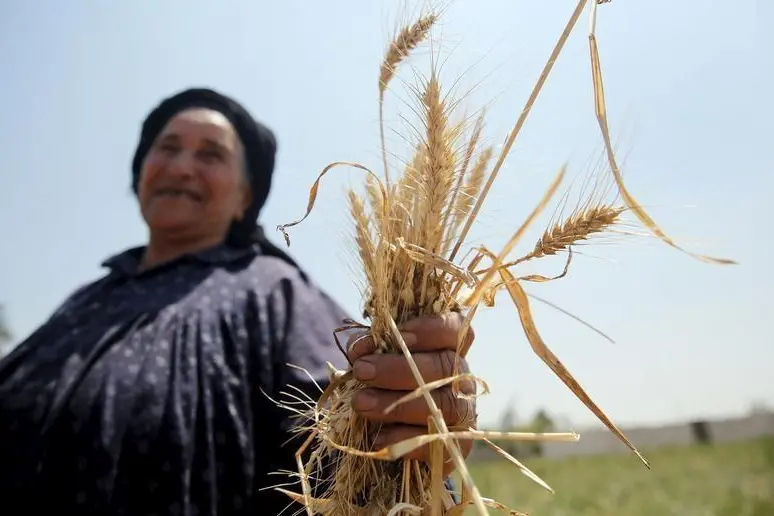PHOTO
PARIS, March 22 (Reuters) - Egypt's state grain buyer will maintain an increased limit for moisture in imported wheat until at least November in order to boost competition between different origins, a French export group said on Wednesday.
Egypt's General Authority for Supply Commodities (GASC) had said in mid-February it would apply a tolerance for moisture content of up to 13.5 percent, above its standard 13 percent limit, without indicating the duration of the change.
"It was a request that came from the French side ... and which met with a favourable response from GASC with the aim of increasing competition in its tenders," Roland Guiragossian, Middle East head at France Export Cereales, told Reuters on the sidelines of the export lobby's annual conference in Paris.
The change had been adopted for a nine-month period running to November, he said, meaning the higher limit would be extended into the 2017/18 season that starts in July.
No one at GASC was immediately available to comment.
The higher moisture limit applies to all origins but favours French wheat in particular as it can struggle to meet the 13 percent ceiling. Exporters nevertheless pay penalties for exceeding the 13 percent level.
Egypt, the world's largest wheat importer, sources most of its supplies from the Black Sea production zone and this season its imports have been dominated by Russian wheat.
The switch to the higher moisture limit, a tolerance Egypt has applied on and off in recent years, along with relatively competitive French prices had prompted exporters to start offering wheat from France in GASCs' tender, Guiragossian said.
Three cargoes of French wheat have been bought by GASC in the past month, the first in a year, as part of a surge in purchases by the government agency as it faces the impact of a currency devaluation on demand for staple bread.
However, shipments have been complicated in the past year by arguments over sanitary rules, and reports from traders that the authorities had provisionally rejected seven cargoes since January suggested continued uncertainty over import terms.
(Reporting by Valerie Parent, additional reporting by Maha El Dahan in Dubai, writing by Gus Trompiz and Sybille de La Hamaide, editing by David Evans) ((Sybille.deLaHamaide@thomsonreuters.com; +331 4949 5145; Reuters Messaging: sybille.delahamaide.thomsonreuters.com@reuters.net))
Egypt's General Authority for Supply Commodities (GASC) had said in mid-February it would apply a tolerance for moisture content of up to 13.5 percent, above its standard 13 percent limit, without indicating the duration of the change.
"It was a request that came from the French side ... and which met with a favourable response from GASC with the aim of increasing competition in its tenders," Roland Guiragossian, Middle East head at France Export Cereales, told Reuters on the sidelines of the export lobby's annual conference in Paris.
The change had been adopted for a nine-month period running to November, he said, meaning the higher limit would be extended into the 2017/18 season that starts in July.
No one at GASC was immediately available to comment.
The higher moisture limit applies to all origins but favours French wheat in particular as it can struggle to meet the 13 percent ceiling. Exporters nevertheless pay penalties for exceeding the 13 percent level.
Egypt, the world's largest wheat importer, sources most of its supplies from the Black Sea production zone and this season its imports have been dominated by Russian wheat.
The switch to the higher moisture limit, a tolerance Egypt has applied on and off in recent years, along with relatively competitive French prices had prompted exporters to start offering wheat from France in GASCs' tender, Guiragossian said.
Three cargoes of French wheat have been bought by GASC in the past month, the first in a year, as part of a surge in purchases by the government agency as it faces the impact of a currency devaluation on demand for staple bread.
However, shipments have been complicated in the past year by arguments over sanitary rules, and reports from traders that the authorities had provisionally rejected seven cargoes since January suggested continued uncertainty over import terms.
(Reporting by Valerie Parent, additional reporting by Maha El Dahan in Dubai, writing by Gus Trompiz and Sybille de La Hamaide, editing by David Evans) ((Sybille.deLaHamaide@thomsonreuters.com; +331 4949 5145; Reuters Messaging: sybille.delahamaide.thomsonreuters.com@reuters.net))





















